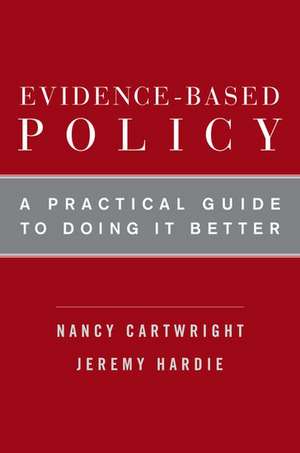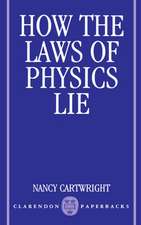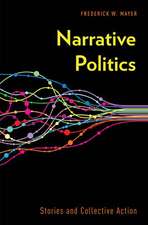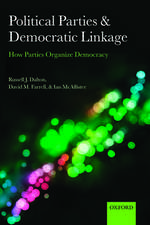Evidence-Based Policy: A Practical Guide to Doing It Better
Autor Nancy Cartwright, Jeremy Hardieen Limba Engleză Paperback – 27 sep 2012
| Toate formatele și edițiile | Preț | Express |
|---|---|---|
| Paperback (1) | 177.32 lei 31-37 zile | |
| Oxford University Press – 27 sep 2012 | 177.32 lei 31-37 zile | |
| Hardback (1) | 627.30 lei 31-37 zile | |
| Oxford University Press – 27 sep 2012 | 627.30 lei 31-37 zile |
Preț: 177.32 lei
Preț vechi: 191.22 lei
-7% Nou
Puncte Express: 266
Preț estimativ în valută:
33.93€ • 35.53$ • 28.14£
33.93€ • 35.53$ • 28.14£
Carte tipărită la comandă
Livrare economică 29 martie-04 aprilie
Preluare comenzi: 021 569.72.76
Specificații
ISBN-13: 9780199841622
ISBN-10: 0199841624
Pagini: 208
Ilustrații: figures
Dimensiuni: 155 x 231 x 15 mm
Greutate: 0.27 kg
Editura: Oxford University Press
Colecția OUP USA
Locul publicării:New York, United States
ISBN-10: 0199841624
Pagini: 208
Ilustrații: figures
Dimensiuni: 155 x 231 x 15 mm
Greutate: 0.27 kg
Editura: Oxford University Press
Colecția OUP USA
Locul publicării:New York, United States
Recenzii
Cartwright and Hardie make a well-meaning and serious attempt to speak to a nonacademic audience, share their expertise, and help solve real and practical policy problems
Refreshing and insightful, this book should be read by all those who inhabit the boundaries between policy, evidence and uncertainty.
Cartwright and Hardie have produced an admirably clear and immensely practical guide on the use of evidence in policy making.
Using evidence to inform public policy seems like the natural, smart, and effective thing to do. But acting on this intuition can be fraught with complexity and can lead to decisions that are neither smart nor effective. Evidence-Based Policy is the primer we have been waiting for, and with its marvelous blend of theory and examples provides compelling evidence that improved decision making is possible.
Evidence-based policy is an enormously serious step in the long, steady improvement of bringing scientific knowledge to bear on public policy. But EBP is not as simple as it is often presented. This is a guide-unprecedented in its rigor and accessibility-to why it is easy to get EBP wrong and why it matters to get it right.
This books sparkles with intelligence. It develops a subtle argument lucidly and accessibly about the role of evidence in policy. It is a powerful antidote to the simplistic idea that policy simply needs to listen to the 'facts' about' what works.' It explains what is really involved in injecting evidence effectively into the formation of social policy. Essential reading for anyone who aspires to rational policy-making.
Chock full of accessible examples, this book explains clearly and cogently what's involved in making intelligent use of evidence in developing social policy. It should be essential reading for all wanting to contribute to effective evidence-based policy.
This well-written book reflects many of the central ideas that underlie my Reports on Child Protection in England. It combines rigorous theory with a valuable profusion of tips and case studies to give practical advice on how to think about what evidence you really need.
the reader will discover an exacting and mathematically precise critique of the explanatory credentials of randomised controlled trials combined with a mass of worldly wise illustrations of the evidence actually needed to support practical policy decisions.
Refreshing and insightful, this book should be read by all those who inhabit the boundaries between policy, evidence and uncertainty.
Cartwright and Hardie have produced an admirably clear and immensely practical guide on the use of evidence in policy making.
Using evidence to inform public policy seems like the natural, smart, and effective thing to do. But acting on this intuition can be fraught with complexity and can lead to decisions that are neither smart nor effective. Evidence-Based Policy is the primer we have been waiting for, and with its marvelous blend of theory and examples provides compelling evidence that improved decision making is possible.
Evidence-based policy is an enormously serious step in the long, steady improvement of bringing scientific knowledge to bear on public policy. But EBP is not as simple as it is often presented. This is a guide-unprecedented in its rigor and accessibility-to why it is easy to get EBP wrong and why it matters to get it right.
This books sparkles with intelligence. It develops a subtle argument lucidly and accessibly about the role of evidence in policy. It is a powerful antidote to the simplistic idea that policy simply needs to listen to the 'facts' about' what works.' It explains what is really involved in injecting evidence effectively into the formation of social policy. Essential reading for anyone who aspires to rational policy-making.
Chock full of accessible examples, this book explains clearly and cogently what's involved in making intelligent use of evidence in developing social policy. It should be essential reading for all wanting to contribute to effective evidence-based policy.
This well-written book reflects many of the central ideas that underlie my Reports on Child Protection in England. It combines rigorous theory with a valuable profusion of tips and case studies to give practical advice on how to think about what evidence you really need.
the reader will discover an exacting and mathematically precise critique of the explanatory credentials of randomised controlled trials combined with a mass of worldly wise illustrations of the evidence actually needed to support practical policy decisions.
Notă biografică
Nancy Cartwright is Professor of Philosophy at UC-San Diego and London School of Economics.Jeremy Hardie is an Honorary Fellow of Keble College, Oxford and a Fellow of King's College London; he is also Vice President of the Royal Economic Society, and was Chairman of the WH Smith Group from 1992 to 2010.














